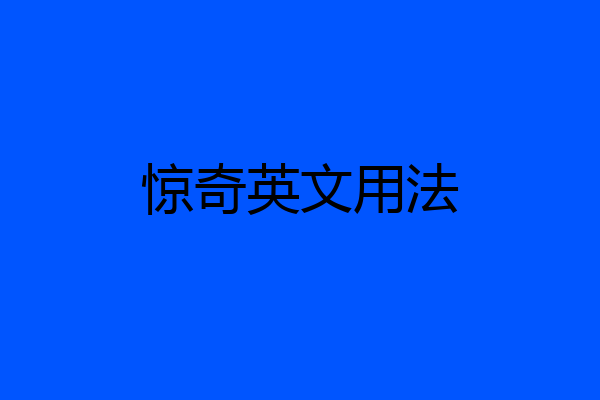
QQ荔枝蜜
surprise和surprised的区别为:指代不同、用法不同、侧重点不同。
一、指代不同
1、surprise:意想不到(或突然)的事。
2、surprised:惊奇的,惊讶的。
二、用法不同
1、surprise:surprise的基本意思是“使惊奇”,指未曾预料的或空前的事物使人产生某种惊讶感或诧异感,强调始料不及或缺乏准备,引申可表示对未做防范的人采取行动或揭露其试图掩盖的事实。用于军事上可指袭击,但不表示是否袭击成功。
2、surprised:surprise是及物动词,其宾语常是人称代词。接名词、代词或以现在分词充当补足语的复合宾语。surprise后接介词at表示“对…感到惊讶”,后接介词from表示“出其不意使…说了”。
三、侧重点不同
1、surprise:是名词和动词词性。
2、surprised:是形容词词性。


广州文仔
surprise 英[səˈpraɪz] 美[sərˈpraɪz] vt. 使惊奇; 突袭; 意外发现; n. 惊喜,惊奇; 意外的事; [例句]I have a surprise for you: We are moving to Switzerland!我有一个惊喜的消息要告诉你:我们要搬去瑞士了![其他] 第三人称单数:surprises 现在分词:surprising 过去式:surprised过去分词:surprised

最爱小白菜@@
帮你找了几本英语用法词典,发现这本《英语基础词汇用法词典》(周贞雄编蓍,金盾出版社出版)讲得最清楚,所以帮你摘录下来,供你参考:surprise vt. 使惊奇,使吃惊 n. 惊奇1. 用作动词,通常是及物动词,注意以下用法:(1) 通常以“人”作宾语:The news greatly surprised us. 这消息使我们大为惊奇。/ What surprised me was that he spokeEnglish so well. 使我吃惊的是他的英语说得那样好。(2) 用于be surprised, 其后可接不定式、介词短语 (主要是at)、从句等:I was greatly surprised to hear [at hearing] he was in prison. 听说他坐牢了,我大吃一惊。/ I was surprised at you. 我对你的举止感到吃惊。/ We were surprised that he lost thegame. 我们对他在比赛中失败感到很意外。后接从句若含有“竟然”之意,通常用虚拟语气 (should+v. ):Hewas surprised that he should be so ill. 他竟病得这么重,他感到很惊奇。与shouldn’t / wouldn’t连用,相当于I rather expect that…,意为“我有点儿预料到”:I shouldn’t be surprised if it rains[rained] in the morning. 要是今天早上下雨,我不会感到惊讶 (即我预料今天早上会下雨)。(3) 注意surprising与surprised的区别:前者指“令人吃惊的”,后者指“感到吃惊的”:I’m surprised at the surprising news. 一听到这个令人吃惊的消息,我感到很吃惊。2. 用作名词,注意以下用法:(1) 表示“惊奇”、“吃惊”,是不可数名词;表示“使人惊奇的事或东西”,是可数名词:She looked at her mother in surprise. 她惊奇地看着她母亲。/ His face showed surprise at the news. 他听到这个消息脸上露出吃惊的神色。/ What a surprise to see youhere! 真想不到在这里见到你! / I have a pleasant surprise foryou. 我要告诉你一件意想不到的好事。(2) 用于to one’s surprise, 意为“出乎意料地”、“使人吃惊的是”:(Much) To my surprise the door was unlocked. 使我 (大为)吃惊的是,门没有锁。/ To the surprise of everybody the man wasthe girl’s father. 使大家吃惊的是,这个人就是这个女孩的父亲。

真巧穆斯林
surprise 既可以做名词,又可以作动词。 to one's surprise 使某人吃惊的是 n eg : To my surprise, he was a thief. v 使… 吃惊 His words surprised me a lot 他的话使我大吃一惊。 v 过去式 surprised 和surprising 都是adj 做表语时,记好“ 人作主语用ed ,物作主语ing eg: He is very surprised to see Jay on the street. The news is very surprising

我是毛毛虫妈
一\surprise是vt.&n.使吃惊;惊奇 1、in surpise惊奇地 2、by surpise出其不意地 3、to one's surpise使人吃惊的是 二\surpised是adj.吃惊的 如:be surpised to do sth. 三\surprising也是形容词,使人吃惊的(与surprised的区别是surprising对象是物体本身令人吃惊,是物体的属性)让人“惊讶”的 surprise 说到 surprise ,大家可要留心了。 surprise 在英语中是个常用词,而且是个兼类词,既可以作动词,还可以作名词,用法多着呢。 ( 1 )作及物动词的 surprise ,其基本含义是“使(人)感到惊讶”,后面可以直接跟宾语。如: His progress surprise me. 他的进步使我感到惊讶。 ( 2 )特别值得一提的是, surprise 的现在分词 surprising 和过去分词 surprised 都可以作形容词,只不过 surprising 在句中多作定语,后面跟名词,如: He gave me some surprising news. 他给我带来一些令人惊讶的消息。 surprising 有时也作表语,但主语多是物,如: The result is surprising. 结果是令人惊讶的。 而 surprised 在句中多作表语,后面可接不定式或从句,其主语多是人,如: I was surprised to see him there. 我真想不到会在那儿见到他。 如果我们想把 surprising 和 surprised 区分开来,大家不妨记住这个句子: We are surprised at his surprising success. 我们对他惊人的成功感到惊讶。 ( 3 )我们再看看 surprise 作名词,其含义是“惊奇;诧异”。 需注意的是 surprise 作名词时,常和不同的介词一起构成介词短语,如: in surprise, to one's surprise, 前者意为“惊讶地;吃惊地”,后者意为“使人惊讶的是……”

宜瑞科技
surprise和surprised的区别:意思不同、用法不同、侧重点不同
一、意思不同
1.surprise意思:惊奇;惊喜;惊讶
2.surprised意思:惊讶的,吃惊的,惊奇的
二、用法不同
1.surprise用法:其宾语常是人称代词。接名词、代词或以现在分词充当补足语的复合宾语。
例句:
John turned around and looked at me in surprise.
约翰转过身来,惊奇地望着我。
2.surprised用法:作表语时含被动意义,主语一般是人,后接由介词at引导的短语、动词不定式或that/wh-从句,表示“对…感到惊奇”。
例句:
What surprised me be that she speak French so well.
使我感到惊奇的是她法语说得那么好。
三、侧重点不同
1.surprise侧重点:作名词,表示惊奇。
2.surprised侧重点:作形容词,表示什么令某人吃惊的。